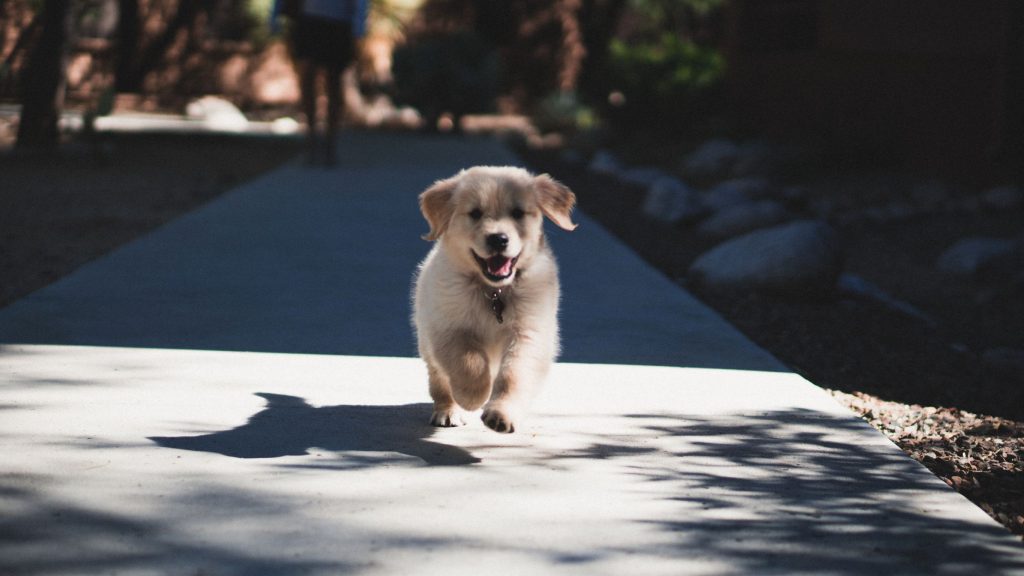Last updated on October 13th, 2022 at 02:33 pm
An age old question
Most people like dogs, and just about everyone loves puppies. If you’re thinking of getting a canine companion of your own, you might be wondering whether to get a puppy or a more mature dog. A dog of any age can be a wonderful pet, so your choice will probably depend on what you’re looking for in a dog, and what your lifestyle is like.
Puppies
8 – 12 weeks old

The youngest you can bring home a new puppy is at 8 weeks old. Puppies under this age are much too young to be separated from their mother and siblings. Even when they don’t need to drink milk, young puppies still need to spend time with their mother and each other. This time is important for your puppy to learn to communicate properly with other dogs. One of the most important things a puppy learns at this age is bite inhibition. This means learning that bites are painful; a dog that has learnt this will learn to respect other dogs, to play appropriately, and communication with other dogs. Taking a puppy home before they are 8 weeks old means your puppy is more likely to nip and behave poorly with other dogs.
Puppies in this age group are like sponges, soaking up all of their new experiences. Anything your puppy learns at this age is going to make a lasting impression on him/her. Begin how you mean to continue; for example, if you’ve decided that your puppy is not allowed on the sofa, implement that rule from the start and stick to it.
At 7 to 8 weeks old, most puppies are still somewhat helpless and babyish. They usually struggle to control their bladders, have little to no sense of danger, and often won’t respond to your voice. A puppy of this age is better suited for someone who has the free time to properly supervise and teach. If you have to leave a young puppy alone most of the day, he/she might start developing unwanted habits such as whining, barking, or chewing your things. And once a puppy develops these habits, it is very hard to train them out if it!
3 – 4 months old

Some owners prefer to wait for their puppies to be a bit older before they take them home. . A 12 week old puppy is much more mature, being physically hardier, with a better attention span. At this age, puppies are playful and often eager to learn. This is a good age to slowly teach basic commands, such as sit.
Puppies can be a bit cheeky at this age. They may try nipping playfully at your hands or refusing to let go of toys. This is your puppy’s way of testing your boundaries. A puppy of this age needs a firm but patient person who will teach them what is and isn’t acceptable. It’s better for your puppy to learn this now, as it can be harder to teach this to an older dog.
4 – 8 months old

At this age, a puppy is becoming much more independent. Many puppies will continue to test your limits to see what they can get away with. With puppies this age, you’ll need to be fair but firm, making sure to consistently assert the rules. Puppies in this age group should not be off-leash outdoors, as they may run off, ignoring your calls (this is a good time to teach the command “come”).
8 – 24 months old, a.k.a Adolesence

For a dog, this age is the equivalent of being a human teenager, complete with a “rebellious” attitude! At this age, they start to experience the effects of hormones. This can make your dog emotional and tricky to manage, sometimes becoming unpredictable.
Depending on your vet’s recommendation, you might consider neutering your dog at this age (the age of neutering varies depending on where you live in the world. Your vet should be basing their recommendation of when/if to neuter on the latest research, and rules/recommendations of the area’s veterinary association). Your dog is becoming sexually mature, and is probably able to reproduce at this age: do not let your dog wander outside alone, as they may mate, leaving you with a litter of unexpected puppies!
Larger breeds have a longer adolescence, and often don’t mature until they are 24 months old. Smaller breeds usually mature faster, and can often be consider adult by the time they are a year old.
Adolescent dogs have usually finished growing (excluding large and giant breeds), and their appearance is unlikely to change much from this point. The ones that will continue growing tend to look a bit awkward at this stage, but should grow out of it. If you wanted to adopt a dog in this age group, he/she has most likely begun training and should know some basic commands (but check with the person or organisation you are acquiring the dog from!).
An adolescent dog needs a consistent, patient hand. Training and socialisation should continue. Your dog may need more exercise to channel all that energy (gentle exercise is best to avoid straining your dog’s bones and joints). A young dog should not be left alone all day, as they will become bored and may develop problematic or destructive behaviour.
Adult

A dog can be considered an adult from around 1 to 2 years old, though some breeds are very slow to mature and remain puppyish until 3 or 4 years of age. Although you might be able to purchase an adult dog from a breeder, you may also get one from a dog rescue or an owner looking to rehome their dog. Ideally you should try to learn the dog’s full history, and get to know the dog a little before committing to him/her.
The big advantage of getting an adult dog is that an older dog typically needs less time and effort than a puppy or adolescent dog. The other main advantage is that the dog is unlikely to change, both in appearance and personality. An adult dog is more predictable: they have grown to their full size, and their personality is established. They should already have some training, and are better at controlling their bowel movements than a puppy would be. While adult dogs may be playful and enjoy exercise, they don’t have the same endless energy as a puppy. Adults are less reliant on you than a puppy, and can spend much more time alone if needed.
All of these advantages come with some disadvantages. An adult dog has already established his/her habits, which might include some unwanted behaviours. Although careful training can help, it may take a long time to reduce or get rid of such behaviours. Adult dogs are less adaptable in terms of new experiences. Something that a puppy would accept quickly might be harder for an adult dog to get used to, such as the sound of a vacuum cleaner. An older dog may also have some age-related health issues.
Conclusion
So, should you get a puppy or an adult? You should think about your lifestyle and personal preferences. Do you have the free time needed to properly raise a puppy, or the resources to afford a dog-sitter? Do you enjoy the challenge of training a young dog, or would you prefer to do minimal training? Weigh up the pros and cons of puppies and adult dogs, and see which is best suited for you.
Regardless of the age group you prefer, make sure you get your dog from a reputable breeder or organisation, or from a private individual that you know and trust. Puppies and dogs from completely unknown backgrounds can be risky: you know nothing about their behaviour, health, or personality. You also run the risk of accidentally acquiring a puppy mill dog, or in some cases even a stolen animal.



Right here is the perfect blog for anyone who really wants to understand this topic. You know so much its almost hard to argue with you (not that I really will need toÖHaHa). You certainly put a new spin on a topic which has been written about for ages. Great stuff, just wonderful!